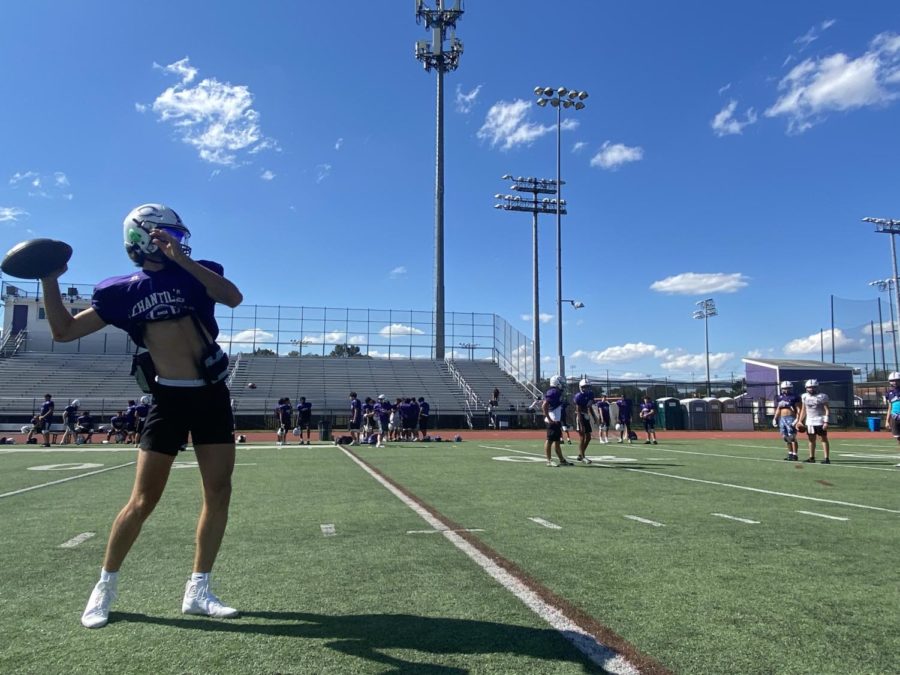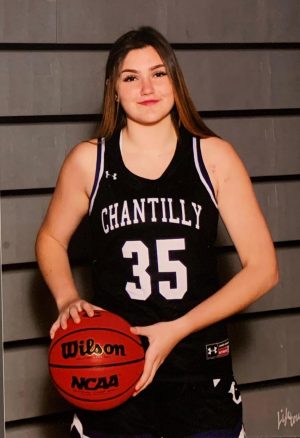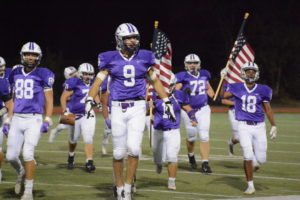Recruited football players tackle trainings, textbooks
Senior Garrett Robertson prepares for practice on the football field on Sept.13.
October 29, 2022
As some seniors fret about acceptances and scholarships, senior varsity football players Garrett Robertson, Liam Turner and Jadyn Oh complete their applications with the comfort of a potential spot at well-known schools where recruitment, the process of filling team spots with prospective student-athletes, makes it possible for them to receive an offer and acceptance.
When it comes to college admissions, sport recruitment is known to give leverage to student athletes. In fact, recruited athletes are known to have the largest admission advantages independent of academic merit, according to The Washington Post.
“If you want to play football and you’re okay with the work and how much time it’s going to take, then there’s a lot of schools that you could get admitted to,” Turner said. “You could never get accepted if you applied as a regular student.”
For this reason, football players recognized by their coaches for recruitment potential attempted to make the most of their summer breaks by attending summer camps, athletic showcases and reaching out to college coaches.
“At the [University of North Carolina (UNC)] camp this summer, we did field goals, then kickoff, then punt charting,” Oh said. “After the camp, one of the UNC kickers and the coach recognized me as one of the top kickers there and talked to me about recruiting.”
The University of North Carolina is of interest to Oh, although he was also recruited by the University of Maryland and several Division III universities, schools with more intimate campuses that often don’t offer athletic scholarships. He also recently received an offer from the Virginia Military Institute. Upon getting recruited by multiple schools, athletes have been making efforts to stay connected to coaches in order to demonstrate continued interest.
“You need to be the one staying in touch with coaches,” Oh said. “They want kids to go to their school that have interest.”
However, admission into college goes beyond athletic connections and requires academic eligibility as well. Impressive academic credentials can even provide students with opportunities to receive financial aid from interested Division I schools, where the best football programs in the country are found, according to Turner.
“Having good grades has helped me a lot and will help in the future with financial aid,” Turner said. “If I were to go to an Ivy, they can’t give athletic money, but they can give a ton of academic money.”
Academically renowned private universities were among the institutions that recruited Turner and Robertson. For Turner, they have taken precedence over other schools.
“My top three right now are Davidson, Dartmouth and Georgetown,” Turner said. “Carnegie Mellon is up there, too.”
Despite being recruited by a multitude of public and private institutions, Robertson committed to William & Mary football in June and will start his education and college football career there in the fall of 2023.
“A lot of athletes, they focus just on a sport but they lack in academics, and then they can’t go to a school because their GPA or test score doesn’t allow them to go there,” Robertson said. “Having the GPA that I did allowed me to get into William & Mary and pursue my dream of playing college football.”
According to Educational Advocates, offers made by coaches to students of interest must coexist with approval from admissions officers in order for students to gain admission into a school. Recruited football players awaiting offers from desired universities continue their concentration on their athletic and academic performance in order to boost their chances of acceptance and receive scholarships.
“For college football, I’m able to use my football skills to help me get into better academic colleges,” Turner said. “If you’re good enough, then the money is also much easier to get.”






